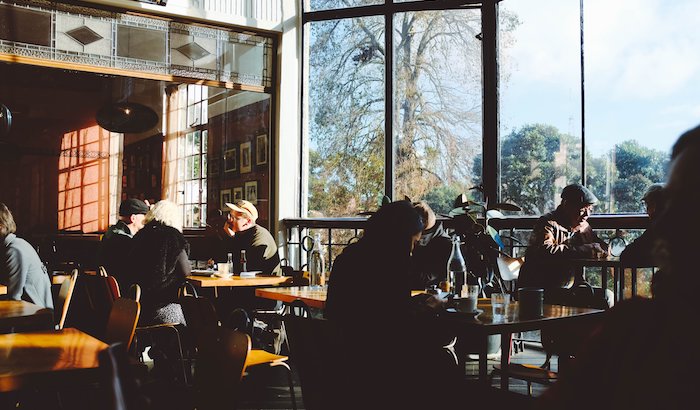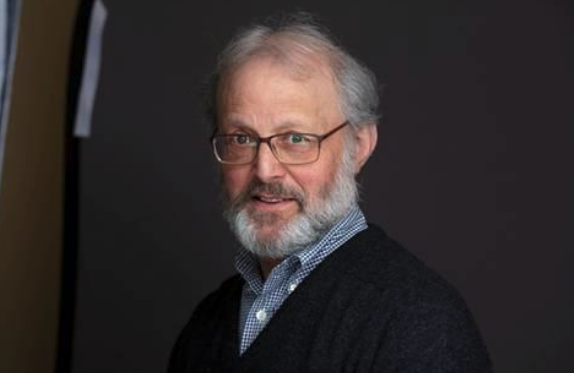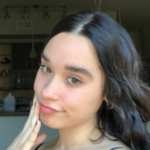
“We are talking about death, so sometimes people can get emotional. They are comfortable doing so, and that speaks to the environment.”
Richard Davis stares at his vacant screen, as squares start simultaneously popping up next to each other. The rows of names and photographed faces morph, coming alive to reveal their owners. Each attendee arrives on time, gearing up for the intense conversation that is to follow.
This isn’t your typical run-of-the-mill meeting. This is a Death Cafe.
“Hello all, let’s get started, does anyone have something they’d like to discuss,” Davis says into his computer.
Sporting his blue flannel and rosy cheeks, the host physically contradicts the subject matter he is about to dive into, but that’s part of his charm. His constant playful banter with the attendees creates a culture of invitation and comfort.
“I think some people expect me to be some creepy guy, all morose, driving a hearse and wearing black, but that’s not me,” Davis says.
The 73-year-old Andover resident is no stranger to the peculiar, having hosted these cafes for more than six years, both in-person and virtually. Davis’s Death Cafes, though various in topics shared, follow a similar format. In-person, he circles the chairs in groups of 10. In these clusters, an average of 40 attendees will break up into four groups, providing the opportunity to have more people sharing at once.
Over Zoom, the physical arrangement is not important, as attendees are tucked away in their spaces of comfort at home. The purpose of a Death Cafe is to give everyone the opportunity to say anything they want or propose any question to the group they would like to. Davis keeps these goals in the back of his mind while facilitating.
Today’s Death Cafe is nothing new, but rather the 60th installment. Davis welcomes 20 attendees—four new to the event, the rest avid regulars. Quickly, he iterates the community standards of the meeting: nothing that is said here will leave here, unless the person designates what they say as shareable. Faces flash, nodding up and down, to note the collective listening.
Richard first learned about death cafes seven years ago. Mount Auburn Cemetery, in Cambridge, MA. was hosting one, yet he waited too long to register and couldn’t attend. Once he learned more about them, Davis paid a visit to the Andover Memorial Hall Library, where he begged them to allow him to host one there.
“We were hesitant to do this at the library,” says Stefani Traina, a member of their community services and adult programming team. “Then we saw how many people showed up, and we could tell people were actually wanting to attend these meetings.”

Due to COVID-19, Davis and the library transitioned to online Zoom calls, to follow protocol and keep everyone safe. Now, Davis typically facilitates one to two of his cafes each month.
Nancy Kendrick, a Death Cafe regular, is in attendance. Kendrick has attended eight of Richard’s facilitated Death Cafes, and reports that she has never once felt uncomfortable or unable to express her thoughts openly to the group.
“We are talking about death, so sometimes people can get emotional,” Kendrick says. “In my experience, they are comfortable doing so, and that speaks to the environment Richard creates.”
Kendrick has spoken about her own concerns, particularly when it came to her lack of fear around death. She was shocked to see how in one cafe, many of the people present unpacked their anxieties about death. She thought that by sharing, she could comfort those like their words had comforted her in past cafes.
“By the time we leave, I really feel like I have been touched by every single person on the call,” she says.
The interconnectedness that stems from the topic of conversations they share is Davis’s driving motivation to continue facilitating. He’s determined to keep creating a communal space where people can navigate and evaluate the deeply taboo subject.
“Richard is providing a huge service to the community by offering these,” Traina says. “He successfully creates an atmosphere where people can be vulnerable.”
Faith is a Texas transplant attending school in Boston whose writing is centered around arts and cultural affairs.

